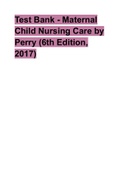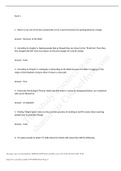Smartnursing
i have essential guides that are A graded, feel free to leave a review.
thank you!
- 188
- 0
- 5
Community
- Followers
- Following
3 Reviews received
193 items

NUR3241 Question Collection: Final Exam Prep
NUR3241 Question Collection: Final Exam Prep 1. In which instance may a surgeon operate without informed consent? a. Invasive procedures b. Emergency situations c. Procedures requiring sedation d. Radiologic procedures 2. The nurse is completing a preoperative assessment. The nurse notices the client is tearful and constantly wringing their hands. The client states, “I’m really nervous about this surgery. Do you think it will be ok?” What is the nurse’s best response? ...
- Exam (elaborations)
- • 36 pages •
NUR3241 Question Collection: Final Exam Prep 1. In which instance may a surgeon operate without informed consent? a. Invasive procedures b. Emergency situations c. Procedures requiring sedation d. Radiologic procedures 2. The nurse is completing a preoperative assessment. The nurse notices the client is tearful and constantly wringing their hands. The client states, “I’m really nervous about this surgery. Do you think it will be ok?” What is the nurse’s best response? ...

Test Bank - Maternal Child Nursing Care by Perry (6th Edition, 2017)
Test Bank - Maternal Child Nursing Care by Perry (6th Edition,2017) Chapter 01: 21st Century Maternity Nursing MULTIPLE CHOICE 1. When providing care for a pregnant woman, the nurse should be aware that one of the most frequently reported maternal medical risk factors is: a. Diabetes mellitus. c. Chronic hypertension. b. Mitral valve prolapse (MVP). d. Anemia. ANS: A The most frequently reported maternal medical risk factors are diabetes and hypertension associated with pregnancy. Both ...
- Book
- Exam (elaborations)
- • 838 pages •
Test Bank - Maternal Child Nursing Care by Perry (6th Edition,2017) Chapter 01: 21st Century Maternity Nursing MULTIPLE CHOICE 1. When providing care for a pregnant woman, the nurse should be aware that one of the most frequently reported maternal medical risk factors is: a. Diabetes mellitus. c. Chronic hypertension. b. Mitral valve prolapse (MVP). d. Anemia. ANS: A The most frequently reported maternal medical risk factors are diabetes and hypertension associated with pregnancy. Both ...

Focused Exam: Alcohol Abuse Results
Focused Exam: Alcohol Abuse Results Experts selected these topics as essential components of a strong, thorough interview with this patient. Patient Data Not Scored A combination of open and closed questions will yield better patient data. The following details are facts of the patient's case
- Exam (elaborations)
- • 8 pages •
Focused Exam: Alcohol Abuse Results Experts selected these topics as essential components of a strong, thorough interview with this patient. Patient Data Not Scored A combination of open and closed questions will yield better patient data. The following details are facts of the patient's case

Peter Simpson Clinical
Assessment & Reasoning Neurologic System Assessment: General • Mental status: assess speech, orientation, memory, and level of consciousness • Posture, position • Assess behavior, mood, and affect • Assess dress, grooming, hygiene Inspection: Neurological • Level of consciousness, orientation • Cranial nerves • Gait, balance, coordination Head: • Tongue-midline? • Symmetry in facial features • Grimace-big smile to assess facial droop • Sensation each...
- Exam (elaborations)
- • 8 pages •
Assessment & Reasoning Neurologic System Assessment: General • Mental status: assess speech, orientation, memory, and level of consciousness • Posture, position • Assess behavior, mood, and affect • Assess dress, grooming, hygiene Inspection: Neurological • Level of consciousness, orientation • Cranial nerves • Gait, balance, coordination Head: • Tongue-midline? • Symmetry in facial features • Grimace-big smile to assess facial droop • Sensation each...

Week 3 ATI Dosage Calculation and Safe Medication Administration 3.0
Week 3 ATI Dosage Calculation and Safe Medication Administration 3.0 A nurse is preparing to administer erythromycin ethylsuccinate 800 mg PO every 12 hr. Available is erythromycin ethylsuccinate suspension 400mg/5mL. How many mL should the nurse administer per dose? 10 mL A nurse is preparing to administer regular insulin 15 units and isophane insulin 40 units subcutaneous at 6:30 a.m. At which of the following times should the nurse administer the medication? 0630 A nurse is prepa...
- Exam (elaborations)
- • 3 pages •
Week 3 ATI Dosage Calculation and Safe Medication Administration 3.0 A nurse is preparing to administer erythromycin ethylsuccinate 800 mg PO every 12 hr. Available is erythromycin ethylsuccinate suspension 400mg/5mL. How many mL should the nurse administer per dose? 10 mL A nurse is preparing to administer regular insulin 15 units and isophane insulin 40 units subcutaneous at 6:30 a.m. At which of the following times should the nurse administer the medication? 0630 A nurse is prepa...

Novel Coronavirus Disease (COVID-19) Part II: Admission to MedSurg Unfolding Reasoning
Name/age: John Taylor is a 68-year-old African-American male BRIEF summary of primary problem: He presented to the emergency department because he felt crummy; complaining of a headache, runny nose, feeling more weak, “achy all over” and hot to the touch and sweaty the past two days. When he woke up this morning, he no longer felt hot but began to develop a persistent “nagging cough” that continued to worsen throughout the day. He has difficulty “catching his breath” when he gets...
- Exam (elaborations)
- • 11 pages •
Name/age: John Taylor is a 68-year-old African-American male BRIEF summary of primary problem: He presented to the emergency department because he felt crummy; complaining of a headache, runny nose, feeling more weak, “achy all over” and hot to the touch and sweaty the past two days. When he woke up this morning, he no longer felt hot but began to develop a persistent “nagging cough” that continued to worsen throughout the day. He has difficulty “catching his breath” when he gets...

Novel Coronavirus Disease (COVID-19) Part III: Critical Care Unfolding Reasoning
Novel Coronavirus Disease (COVID-19) Part III: Critical Care Unfolding Reasoning Name/age: John Taylor is a 68-year-old African-American male. BRIEF summary of primary problem: He presented to the emergency department because he felt crummy; complaining of a headache, runny nose, feeling more weak, “achy all over” and hot to the touch and sweaty the past two days. When he woke up this morning, he no longer felt hot but began to develop a persistent “nagging cough” that continued...
- Exam (elaborations)
- • 22 pages •
Novel Coronavirus Disease (COVID-19) Part III: Critical Care Unfolding Reasoning Name/age: John Taylor is a 68-year-old African-American male. BRIEF summary of primary problem: He presented to the emergency department because he felt crummy; complaining of a headache, runny nose, feeling more weak, “achy all over” and hot to the touch and sweaty the past two days. When he woke up this morning, he no longer felt hot but began to develop a persistent “nagging cough” that continued...

General Surgery EOR Exam Study Guide
Cardiac Disease (surgical recall p 96) (pocket notebook 15-1) • MI o Periop MI risk: § Goldman criteria for noncardiac surgery – RF include: • CHF (check EF à if < 35% = no surgery) • MI w/in 6 months (check EKG à stress test à cath à reperfusion) • Arrhythmia • Age > 70 • Emergent surgery • Aortic stenosis, poor medical condition, thoracic or abdominal procedure o Most dangerous period for a post-op MI are the 6 months following a previous MI (2/3 occur on...
- Exam (elaborations)
- • 50 pages •
Cardiac Disease (surgical recall p 96) (pocket notebook 15-1) • MI o Periop MI risk: § Goldman criteria for noncardiac surgery – RF include: • CHF (check EF à if < 35% = no surgery) • MI w/in 6 months (check EKG à stress test à cath à reperfusion) • Arrhythmia • Age > 70 • Emergent surgery • Aortic stenosis, poor medical condition, thoracic or abdominal procedure o Most dangerous period for a post-op MI are the 6 months following a previous MI (2/3 occur on...

HLTH 419 exam 1
1. Which is not one of the key components in the 3-part framework for guiding behavior change: Answer: Remover of the Rider 2. According to chapter 6, helping people feel as though they are closer to the "finish line" than they first thought did NOT have any impact on the percentages for overall change. Answer: False 3. According to Chapter 3, ambiguity is exhausting to the Rider because the Rider is tugging on the reigns of the Elephant trying to direct it down a new path. Answer: T...
- Exam (elaborations)
- • 5 pages •
1. Which is not one of the key components in the 3-part framework for guiding behavior change: Answer: Remover of the Rider 2. According to chapter 6, helping people feel as though they are closer to the "finish line" than they first thought did NOT have any impact on the percentages for overall change. Answer: False 3. According to Chapter 3, ambiguity is exhausting to the Rider because the Rider is tugging on the reigns of the Elephant trying to direct it down a new path. Answer: T...

Home Health Care
Mr. Jones is a 69-year-old who was discharged from the hospital yesterday following a short hospitalization to treat a leg ulcer that became increasingly worse (increased pain and inflammation) over a two-week period prior to admission. In addition, he has a diagnosis of congestive heart failure (CHF) and diabetes. Mr. Jones lives alone in a senior citizens’ high-rise
- Exam (elaborations)
- • 9 pages •
Mr. Jones is a 69-year-old who was discharged from the hospital yesterday following a short hospitalization to treat a leg ulcer that became increasingly worse (increased pain and inflammation) over a two-week period prior to admission. In addition, he has a diagnosis of congestive heart failure (CHF) and diabetes. Mr. Jones lives alone in a senior citizens’ high-rise

Test Bank for Canadian Fundamentals of Nursing, 6th Edition| Test Bank for Canadian Fundamentals of Nursing 6th Edition by Potter > all chapters 1-48 (questions & answers) A+ guide.
i do not advice anyone to buy this test bank. it is useless
Edward Carter Shadow Health-Unguided Intermediate Patient Case Results
NSG 6005 midterm